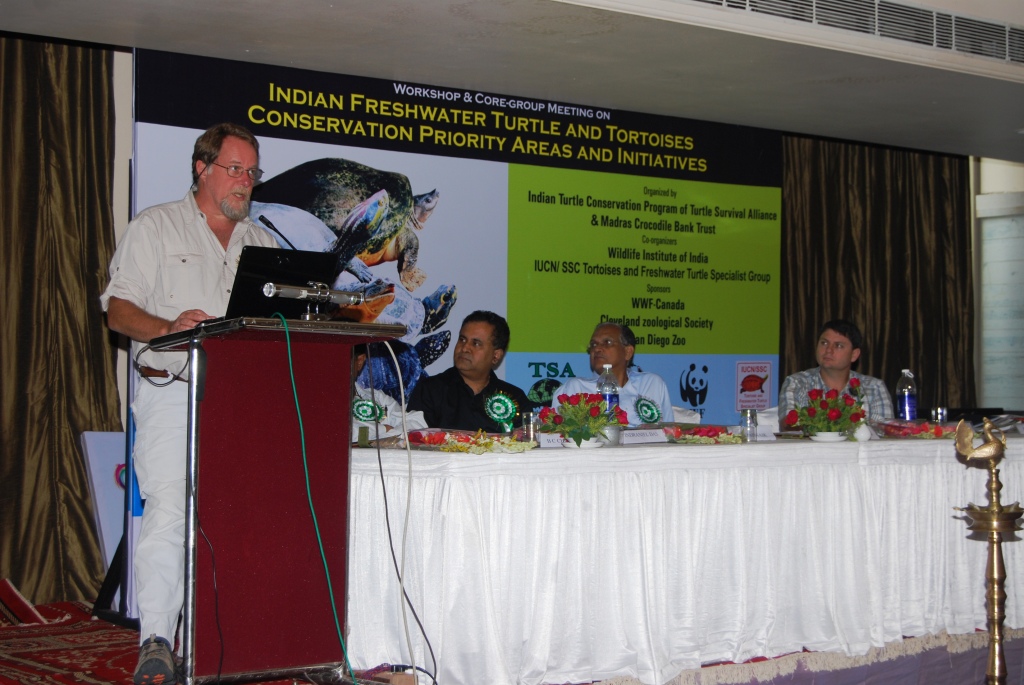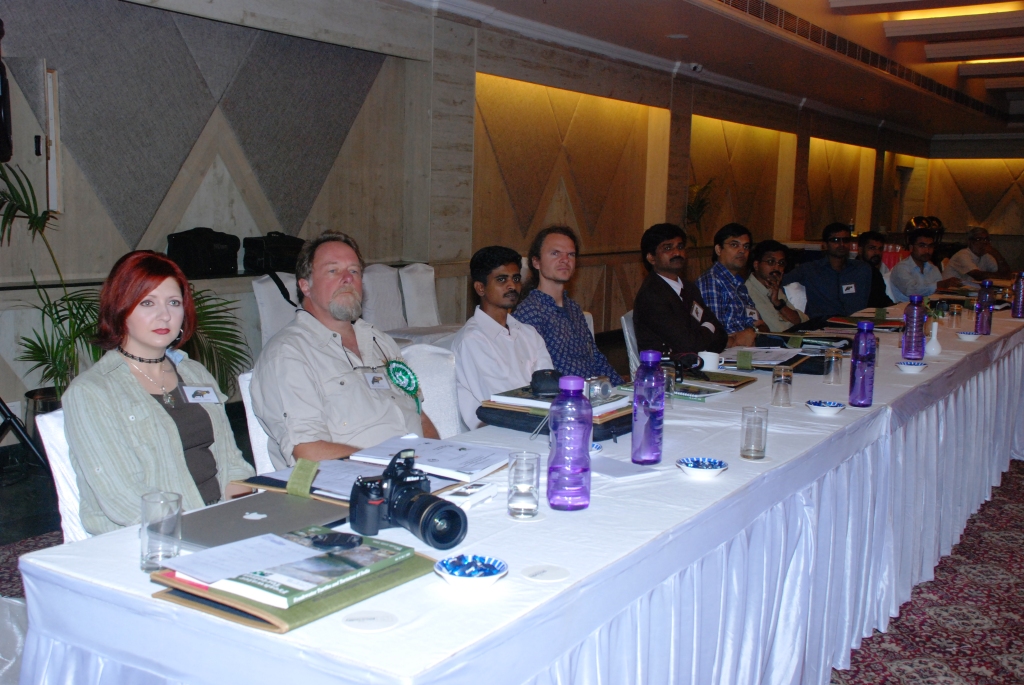Indian Workshop is a Success
by Shailendra Singh 

Recently the Indian Turtle Conservation Program (ITCP), in association with Wildlife Institute of India (WII) and IUCN/SSC Tortoises and Freshwater Turtle Specialist Group hosted the “Indian Freshwater Turtle and Tortoises Conservation Priority Areas & Initiatives” workshop and core-group meeting. The ITCP is a joint countrywide initiative of the Turtle Survival Alliance (TSA), Madras Crocodile Bank Trust and San Diego Zoo Global to protect threatened freshwater turtles and tortoises and their habitats. The workshop was co-sponsored by the TSA, WWF-Canada, Cleveland Zoological Society, San Diego Zoo Global and Seksaria Sugar Factory.
The workshop took place October 22-24, 2010 in Lucknow, the capital city of Uttar Pradesh. The main objectives of the meeting were to review the implementation of the 2005 TSA/MCBT “Conservation Action Plan for Indian Endangered Turtles and Tortoises” and to discuss and prioritize important turtle areas for conservation action across India, while reviewing their potential to support new programs. Participants also were tasked with identifying competent local partners and collaborators for key turtle conservation initiatives.

Five priority turtle areas in India were identified and discussed at the meeting. These are the Chambal River and Upper Ganges River System (central India), the Terai Region (northern India), the state of Assam (northeastern India), the Sunderbans of West Bengal and the state of Orissa (eastern India), and the Western Ghats and the states of Tamilnadu and Andhra Pradesh (southern India). When combined, these five above discussed areas support India’s most highly endangered and charismatic turtles. Priority areas were selected on the basis of species richness, endemism, proportion of endangered turtles, and their potential to host successful conservation programs.

The workshop aimed to synchronize (and capitalize on the efforts of) the various organizations and individuals working to conserve chelonians in India. The workshop was endorsed by the Wildlife Division of the Ministry of Environment and Forests through an official message and as a part of the activities associated with the national agenda to achieve the goals for the “International Year of Biodiversity.”
By bringing together forty-five national and international frontline researchers, conservationists, educators, socio-economists, managers, policy makers and NGO representatives from 12 different Indian states, the United States and Europe, the workshop sought to develop regional conservation action plans and identify immediate needs for the five Turtle Priority Areas. The workshop was chaired by renowned herpetologist, Prof. Indraneil Das (University Malaysia Sarawak) and vice-chaired by pioneer turtle and crocodilian biologist Prof. BC Choudhury from WII. Mr BK Patnaik (Principal Chief Conservator of Forests, Uttar Pradesh Forest Department) and Mr. Rick Hudson (TSA President) kindly graced the event as Chief Guest and Guest of honor respectively.
During 15 regional and thematic sessions, 38 presentations were made by researchers and experts to review past/current conservation initiatives under the ITCP and other institutions/program, to share experiences and to propose possible future actions. The presentations were helpful in sparking follow-up discussions to finalize action plans and further recommendations. Some leading organizations like Zoo Outreach Organization, Wildlife Institute of India, TRAFFIC-India, Centre for Environmental Education, Central Zoo Authority, and Development Alternatives greatly expressed their commitments as national collaborators to the action plan, in addition to putting forward recommendations in their field of expertise.

The workshop identified a charismatic turtle species (ex: Batagur kachuga, Chitra indica, Pangshura sylhetensis, Nilssonia leithii) as flagship species for each regional program and prioritized other species in terms of their immediate conservation need. On the basis of the rigorous review of the current situation and available (and possible future) resources regional actions were recommended.

In addition, participants were invited to step-up as regional partners to facilitate future programs in their respective regions. The workshop recommended actions for each of the five areas and sessions held during the meeting were used to discuss conservation plans for the next decade. Plans include monitoring of head-started juveniles from TSA/ state run hatcheries, habitat assessment for re-introduction programs, developing assurance colonies of critically endangered turtles, developing species-specific conservation strategies for a few critically endangered turtles, intensifying biological studies, halting illegal trade, rehabilitating rescued/confiscated turtle stocks, developing national and regional inter-operational strategies, enhancing community participation through education and social rehab initiatives and developing trained human resources. It became clear during the meeting that the turtle trade is possibly the biggest threat to surviving threatened Indian freshwater turtle and tortoises populations and there is an urgent need for institutional cooperation to stop this threat.
Currently the recommendations are being detailed and finalized. The plan will be reviewed by the review committee before distribution this December so the implementation of the recommendations can be initiated with the beginning of next year.
The workshop also recommended holding five regional meetings in association of non-government and government organizations of similar interest, in all five above discussed regions to invite regional players to discuss the recommendations to gain more practical grounds. It was also recommended that the regional plan may incorporate the training to the different target groups (student, forest department, veterinarians, temple committees etc) to facilitate long term turtle conservation in respective regions.
The alliance of ITCP and other regional partners will implement the recommendations from the national and regional action plans through mobilizing and facilitating conservation teams to achieve the objectives under the supervision of TSA and other leading conservation agencies.
In addition, ITCP has set-up annual “Turtle Conservation Service Award” and “Turtle Field Conservation Award” this year. During the workshop, awards for the year 2010 were presented to Suresh Pal Singh (UPFD) and Bhasker M. Dixit (Terai Environmental Foundation) by Mr. Rick Hudson and Dr Patrick Aust. These awards were given to Mr. Singh and Mr. Dixit for their outstanding services for captive conservation and management of north Indian Turtles at state run Kukrail facility for over 25 years and contribution to the TSA ex-turtle poacher rehab initiative in Terai (foothills of Himalayas) during last five years. Each award carried a certificate, souvenir and cash of Indian Rupees 4000.
The support of all above-mentioned organizations and their heads- especially Ms Patricia Koval, Mr AK Shrivastava, Mr PR Sinha and Dr Anders Rhodin- are greatly appreciated. Local organizations- especially Terai Environmental Foundation, Katerniaghat Foundation and Turtle Conservation & Research Program- are acknowledged for their assistance. We would also like to acknowledge Dhurvjyoti Basu, Brian D. Horne, Pradeep Saxena , Sanjai Kumar, Heather Lowe, Gowri Mallapur, Ashutosh Tripathi and KB Bhadauria for their support in organizing this very important and inspiring workshop.
